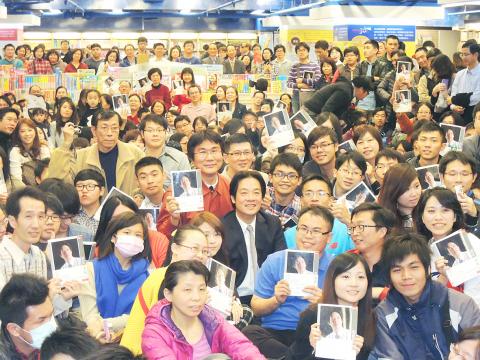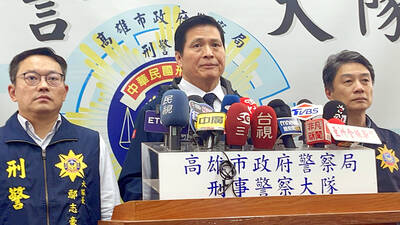Taipei Times: You were a doctor before becoming a politician. Does that experience provide you with a different perspective when tackling governance and interacting with the public?
William Lai (賴清德): There are three “spirits,” so to speak, that I adhere to in my role as a mayor when implementing governance.
First of all are the Democratic Progressive Party’s (DPP) founding principles of “integrity, diligent government and love of country.”

Photo: Tsai Wen-chu, Taipei Times
Second, the “spirit of medicine,” and third, the “spirit of [Angus] MacGyver” [the protagonist of US television series MacGyver, who is known as a problem solver]. Despite difficult circumstances, MacGyver is always able to solve problems at crunch time by pulling together existing resources, with creativity and ingenuity. It’s a mindset different from one that otherwise always asks for money and personnel whenever a problem arises and cites the lack of them as an excuse for inaction.
As for the “spirit of medicine,” my past experience as a physician certainly has been helpful in my political career. When you are ill, you have to seek out the right type of doctor; the sickness could be said to be halfway cured when you find the right kind of doctor. For instance, if I am a nephrologist, someone who has cardiac problems should then visit cardiologist for treatment and not me, who would not have the expertise in treating heart disease as a cardiologist does.
Having trained as a physician, I adhere to the adage that “prevention is better than cure.” Such a mindset drives me to regard the city as an organic entity and treat it as if it were a human being, which means we approach issues by making a diagnosis first and find out what problems there may be, as in the case of the merger of Tainan city and Tainan county; then solve problems by proposing appropriate measures. That’s how the city progresses.
TT: In the book you recently published, you mention the term “Tainan brand” through which you have largely enhanced the city’s visibility. What exactly is the “Tainan brand”?
Lai: To do marketing, you must first have a brand. By having a brand, there can then be a representation, and therefore a “self-awareness” to allow for successful marketing. So we first market the name “Tainan.”
For instance, take the buses in Tainan. There used to be three bus companies — Sinying, Kaohisung and Singnan. We have integrated them all to be called Greater Tainan buses. It fosters a sense of identification among the Tainan residents, which then translates into support.
TT: What lies at the core of the “Tainan brand”?
Lai: Culture is the core of the “Tainan brand.” Tainan is Taiwan’s first city and has in its possession the richest cultural and historical assets, an aspect that’s incomparable with other cities and counties. In the past four years, of course, we’ve employed special approaches in all the various arenas to allow for the best effects, but without a doubt, at the core of the content is culture. Particularly so in light of globalization and the competition it brings, culture is the root; if you don’t have strong roots, you will be swept into oblivion by the tidal wave of international competition. When we strengthen our roots, technology acts as our wings.
TT: You have said that “without roots, there’s no culture” and “without the local, there’s no international.” With culture as the cornerstone in your governance of the city, how then do you link it to the aspects of pro-localization education and Taiwanese identity, and highlight Taiwan’s values via the promotion of Tainan’s culture?
Lai: There are several aspects in answering that question. First, marketing Tainan, from local to international. Let’s take a product as an example. HTC Corp spent big bucks to have Robert Downey Jr in its commercial, yet all it advertised was just “HTC (hold this cat)” [among other words Downey said “HTC” could stand for], without including any element of Taiwanese culture. Then you look at South Korean Samsung’s commercial, one where it featured [South Korean star] Kim Soo-hyun biking past a pair of wings that reflected Korean culture. Taking advertisements of luxury goods such as French bags or French perfume as another example, when you watch these commercials, you can tell they are advertising French products, and so on. Highlighting a culture’s “localness” does not mean airing a political view, for it is also a very important element in economic development and product marketing.
When we visit places around Taiwan or cities overseas, if I don’t talk about Tainan’s culture, it’s like our feet are prevented from stepping any further.
Second, in terms of the cultural connotation, Tainan has a mission — which is to build Tainan as Taiwan’s cultural capital and allow people who set foot in Tainan to feel like they have visited Taiwan as a whole, thereby fostering a sense of pride among Tainan residents, which Taiwanese can identify with, hence the possibility of unifying Taiwan.
I have this thought because when we were little, in classes we were required to memorize places such as [China’s] Yangtze River and the Yellow River, without learning anything about our own Jhuoshuei River (濁水溪) or Tsengwen River (曾文溪). We learnt by heart what goods are the products of which provinces in China, but we were not taught where Tainan’s water chestnut or Yunlin’s water melons came from. This is absurd.
Therefore, we must develop Tainan into a cultural capital to allow people to know about Taiwan, and mold a sense of identity people can identify with.
To do so, we approach the historical aspect in depth and culture in all its breadth. In terms of historical depth, there is the Tsailiao Fossil Museum in [Tainan’s] Zuozhen District (左鎮), where the fossils on display originated locally, including that of a woolly mammoth and Rhinocerossinensis hayasakai and various animals, as well as fossils of human skulls, which date back about 20,000 or 30,000 years ago. Then there is an archeological site in Sinshih (新市) that dates back to between 5,000 and 7,000 years ago. If one visits Anping District (安平), one can see the Eternal Golden Castle (億載金城), Anping Fort (安平古堡), Chihkan Tower (赤嵌樓) and all the historical sites. Then, there is the National Museum of History in Annan District (安南), which displays the history of ordinary people’s ways of living back then. All these show the depth of Tainan’s history.
Tainan’s culture is also broad. For example, the four major religions in Taiwan all started out in Tainan in their early days. Kaiyuan Monastery (開元寺), Buddhism’s first temple in Taiwan, is in the North District; the first church was the SinLau Hospital’s affiliated church; the first Catholic church is in Houbi (後壁); and the first Daoist temple, honoring [one of the most revered Taoist deities] the Heavenly Upper Emperor (玄天上帝), is also in Tainan.
Aside from all these, we also undertake systematic planning to repair and restore historical sites and historical architecture, and cooperate with the private sector in promoting the revitalization of old houses. We also use these historical and cultural elements to promote the development of cultural innovation.
TT: You’ve previously announced an initiative to push the English language as Tainan’s second official language. What concrete steps are being taken toward realizing this goal?
Lai: Culture is our root, and the English language is our tool, or see it as our foot, if you will. Given that language is the primary tool of communication, a lack of English proficiency hampers one from gaining an advantageous position in international competitiveness.
With culture as our roots and technology as our wings, we also need to be equipped with English proficiency to stay competitive. We’ve brought up this idea with the central government, which responded by saying there are difficulties [in implementing this policy]. Since Tainan was Taiwan’s first city and in the early days the door to the outside world, we are willing to take the initiative, in the span of a 10-year plan, to develop Tainan into the first city [in Taiwan] that uses English as its second official language.
To actualize this goal, first we will work to build an English-friendly environment in the city.
Second, we are contemplating the idea of, as a start, designating a school where a selected number of classes would all be taught in English. Aside from providing assistance to the private sector in enhancing English skills, the city government’s civic servants also ought be in step with the plan as well by working to polish their English proficiency.
Government documents are another area of focus. Right now, for example, government-issued certificates and contracts are in both Chinese and English, whereas in the past, they were in Chinese only.
It is the hope that after 10 years, Tainan city councilors will be able to question the mayor in English.
Part two of this interview will be published tomorrow.

Twenty-four Republican members of the US House of Representatives yesterday introduced a concurrent resolution calling on the US government to abolish the “one China” policy and restore formal diplomatic relations with Taiwan. Led by US representatives Tom Tiffany and Scott Perry, the resolution calls for not only re-establishing formal relations, but also urges the US Trade Representative to negotiate a free-trade agreement (FTA) with Taiwan and for US officials to advocate for Taiwan’s full membership in the UN and other international organizations. In a news release announcing the resolution, Tiffany, who represents a Wisconsin district, called the “one China” policy “outdated, counterproductive

Actress Barbie Hsu (徐熙媛) has “returned home” to Taiwan, and there are no plans to hold a funeral for the TV star who died in Japan from influenza- induced pneumonia, her family said in a statement Wednesday night. The statement was released after local media outlets reported that Barbie Hsu’s ashes were brought back Taiwan on board a private jet, which arrived at Taipei Songshan Airport around 3 p.m. on Wednesday. To the reporters waiting at the airport, the statement issued by the family read “(we) appreciate friends working in the media for waiting in the cold weather.” “She has safely returned home.

TRUMP ERA: The change has sparked speculation on whether it was related to the new US president’s plan to dismiss more than 1,000 Joe Biden-era appointees The US government has declined to comment on a post that indicated the departure of Laura Rosenberger as chair of the American Institute in Taiwan (AIT). Neither the US Department of State nor the AIT has responded to the Central News Agency’s questions on the matter, after Rosenberger was listed as a former chair on the AIT’s official Web site, with her tenure marked as 2023 to this year. US officials have said previously that they usually do not comment on personnel changes within the government. Rosenberger was appointed head of the AIT in 2023, during the administration of former US president Joe

ON PAROLE: The 73-year-old suspect has a criminal record of rape committed when he was serving in the military, as well as robbery and theft, police said The Kaohsiung District Court yesterday approved the detention of a 73-year-old man for allegedly murdering three women. The suspect, surnamed Chang (張), was arrested on Wednesday evening in connection with the death of a 71-year-old woman surnamed Chao (趙). The Kaohsiung City Police Department yesterday also unveiled the identities of two other possible victims in the serial killing case, a 75-year-old woman surnamed Huang (黃), the suspect’s sister-in-law, and a 75-year-old woman surnamed Chang (張), who is not related to the suspect. The case came to light when Chao disappeared after taking the suspect back to his residence on Sunday. Police, upon reviewing CCTV